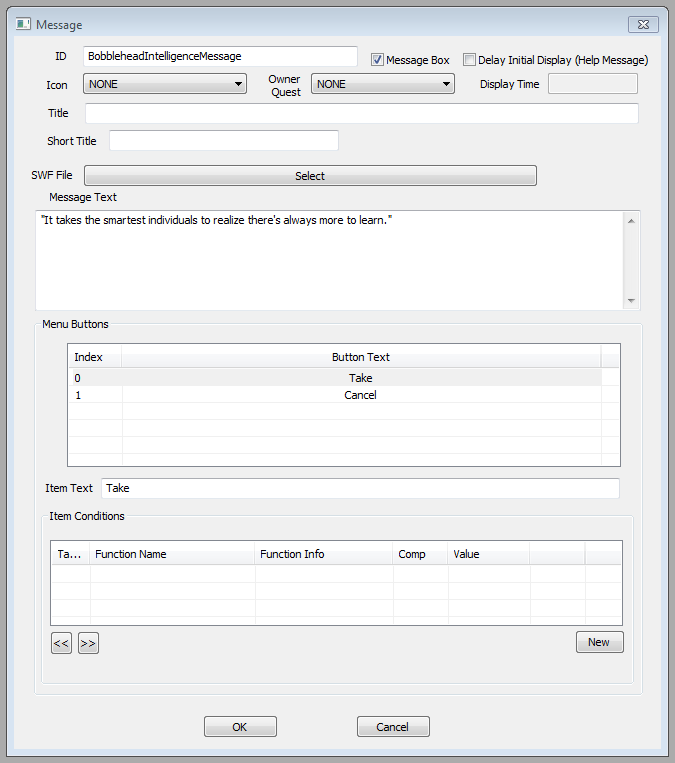Message
Type: MESG
Papyrus: Message Script
Messages create localizable text strings used for message boxes, notifications, text overrides and help text. The Message object is found within the Object Window under the Miscellaneous Category.
Editor Dialog[edit | edit source]
- ID: The ID, also referred to as Editor ID, is used by the Creation Kit to uniquely identify this record within a Data File.
- Icon: The Texture File that will be used for this object's icon. This property is depreciated, obsolete, or does not appear to be used by the game.
- Owner Quest: Optionally, the Quest that owns this message, if it contains Text Replacement formatting that needs to extract data from the quest.
- Title: The title of the message. For Text Overrides, fill in the Title and leave the Message Text blank.
- Swf File: The Flash File to display.
- Message Text: The body text of the message. For Notifications, fill in the Message Text and leave the Title blank.
- Message Box: When checked, the message is displayed as a dialog box that pauses the game and waits for a response. Otherwise the message will be briefly displayed at the top left of the screen.
- Display Time: The number of seconds the message will be displayed. Only applicable when the message box option is unchecked. This does not appear to actually function correctly: regardless of the value set here, the message appears to always display for about two seconds.
- Menu Buttons: A list of buttons on the message form. Right click to create a new one.
- Item Text: The text on the selected button.
- Item Conditions: A list of conditions that must be satisfied for the selected button to show.
Message Text[edit | edit source]
To designate where to put the numbers in the message in the editor, the following format is used:
%[flags][width][.precision]f
If you want the message to contain a % sign, then you must use a double % sign like so:
%%
Flags[edit | edit source]
Flags is one or more of the following characters:
| Character | Meaning | Default |
|---|---|---|
| - | Left-align the number | Right-align the number |
| + | Prefix the number with a + or - sign | Prefix only negative numbers with a - sign |
| 0 | If width is prefixed with a 0, 0s are added until the minimum width is reached. If both 0 and – flags appear, the 0 is ignored. | No padding is used |
| <Space> | Prefix the value with a space if the output value is signed and positive. This flag is ignored if both the space and + flags appear. | No space appears |
| # | Forces the number to have a decimal point. | Decimal point appears only if numbers follow it. |
Width[edit | edit source]
This is an optional number that specifies the minimum number of characters to output. This includes the sign character (+ or -) and the decimal point, if any.
Precision[edit | edit source]
This value specifies the number of digits after the decimal point. If a decimal point appears, there is always at least one digit before it. The value is rounded to the appropriate number of digits.
The default precision is 6. If precision is 0, or if the period appears without a number following it, no decimal point is printed.
Examples[edit | edit source]
Values:
5 1.1 -0.523456745
"%f" results in:
5.0 1.1 -0.523457
"%.0f" results in:
5 1 -1
"%+05f" results in:
+0005 +01.1 -0.523457
"%10.2f" results in:
5.00
1.10
-0.52
